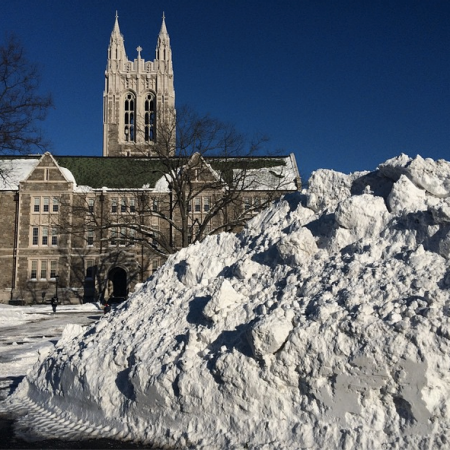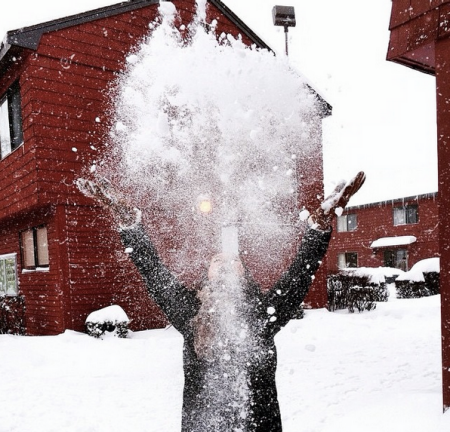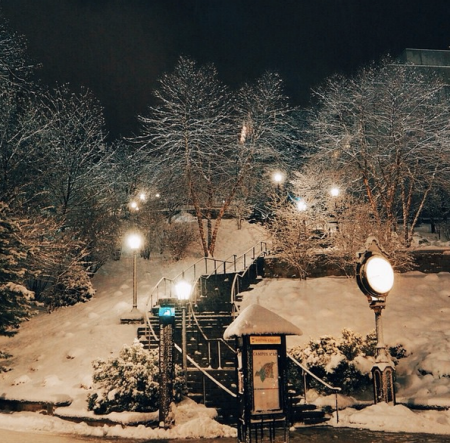
The final week of January proved a memorable one for the Boston College community, as Winter Storm Juno dumped some two feet of snow and forced the University to shut down for two days.
The University resumed normal operations yesterday; Woods College of Advancing Studies and evening classes that were scheduled for after 5 p.m. on Wednesday were held as planned. BC had formally closed at 5 p.m. on Monday, as snow associated with the arrival of Juno began to fall in the Boston area.
But there was plenty of activity at the Heights during the 48-hour period BC was closed, as Dining Services, Facilities Services, Residential Life and Boston College Police staff worked extra hours to ensure essential services were maintained for students and others on campus. Many of these employees wound up staying overnight in makeshift accommodations, including the second and third floors of Maloney Hall, the Faculty Dining Room in McElroy Commons, and the Heights Room of Corcoran Commons.
Dining Services Associate Director Megan O’Neill said about 75 BCDS employees helped to fill the gaps during the blizzard, including 46 who were left on campus Monday after the University closed. Fifteen staffers came in on Tuesday to provide assistance – although Massachusetts had instituted a driving ban, O’Neill explained, dining services employees on college campuses are considered “essential personnel” and were thus able to travel to campus.

The advance warning for Juno and its potential severity enabled BCDS and other departments to prepare for an emergency situation, O’Neill explained, such as obtaining air mattresses and cots, knowing that they would be needed for employees staying overnight.
“It’s a lot to hunker down for the night on an air mattress, away from your family, but our staff is used to it,” said O’Neill. “We look at it as an important part of the job: The students are stuck here, after all, and we want to make sure everyone’s taken care of.”
O’Neill also praised the more than 30 student employees who lent assistance during the two days.
Facilities Services administrators estimated that about 225 employees – staff as well as contractors – were involved in snow management and removal. These efforts required 60 pieces of equipment, about 120 tons of bulk road salt and an additional 12 tons of bagged material. By the end of yesterday, some 20,000 yards of snow cleared from the three BC campuses had been hauled to Brighton Campus.
But as Associate Director of Facilities Services Regina Bellavia noted, statistics tell only part of the story of BC’s response to Juno.
“In a storm like this, you need all hands on deck – or, more appropriately, on a shovel,” she said. “Facilities has to clear the stairs, walkways, building entrances, fire hydrants, curb steps – and then haul all that snow away. There were some people who came to work 7:30 Monday morning and didn’t leave until about 9 p.m. Tuesday; one contractor stayed until Thursday morning. You just have to do the job, because people are depending on you.”

Bellavia emphasized, however, the collaboration with other departments that made it possible to do the job. “Dining Services kept everyone fed and hydrated, which is so important when you’re doing this work, and BC Police worked hard to keep us safe and also provided details for the hauling operation, which was vital to the snow removal.”
BC Police Lt. Jeffrey Postell said about 25 BCPD staff worked for a 36-hour period during the blizzard, swapping in and out for one another for rest periods. Officers were on the lookout for downed power lines or trees, traffic and road obstructions, and anything else that might threaten public safety.
But staff also made every attempt to be pro-active on safety matters, he added: “When we were in the dining and residence halls, we would talk with students whenever we could, and just remind them to be careful. It’s important for them to know that somebody’s watching out for them.”
Office of Residential Life staff – especially the 13 residence hall directors and 184 resident assistants – had a somewhat different task during the two-day shutdown, according to director George Arey. “Their job was to be visible, to help keep students informed about what was happening, to help address problems that might arise, and to give them options for how to pass the time.”
Residence hall staff led yoga sessions and liturgical activities, organized ping-pong tournaments and snowman-making contests, and offered up numerous pancake breakfasts, Arey said.
Some students, of course, had their own ideas about what to do on a snow day, and in at least one case made a very good impression on local residents: Two students in the Commonwealth Avenue residential area shoveled out a neighbor’s car, and refused her offer of payment.
“Sometimes, in a situation like this, you think to yourself, ‘How do we get through this?’” Bellavia said. “And then you look at the campus, and you realize we did.”



